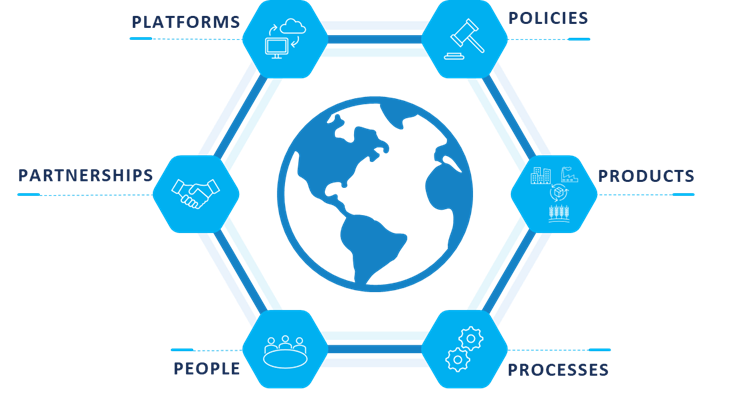The aquaculture industry has emerged as a critical player in meeting global seafood demand while addressing environmental concerns and overfishing. As the world seeks sustainable alternatives to traditional fishing practices, new policies and platforms are paving the way for an innovative and sustainable path for the aquaculture sector. This industry is growing exponentially, and with the Earth’s oceans and freshwater bodies facing unprecedented stress from climate change, pollution, and overfishing, aquaculture offers a promising solution to secure a steady seafood supply while reducing pressure on natural ecosystems.
However, the rapid growth of the aquaculture industry has brought its own set of challenges, including disease outbreaks, habitat degradation, and inefficient resource utilization. While the future of sustainability is shaped by the 6P framework from Policies to Platforms and initiatives driven by policies that influence products, people, and processes within the industries, it is necessary to understand both people who are developing new solutions and those who are using them, while addressing new partnerships that help drive sustainability and the circular economy.

The Frost & Sullivan’s System Thinking 6Ps Framework to Future of the Sustainability & Circular Economy
Governments and international organizations are recognizing the urgent need to ensure the responsible growth of the aquaculture sector, with a focus on platforms and the need for accurate measurement, monitoring, reporting and more importantly verifying of data and how these platforms can not only drive efficiency and productivity in the supply chains of these industries but also can provide a much more data-driven approach for policy formulation going forward.
The digital era has brought forth an array of technological advances that are revolutionizing the aquaculture industry. From precision feeding to real-time monitoring, these innovations enhance efficiency, minimize waste, and contribute to the industry’s sustainability goals. We had the opportunity to discuss with Amit Fischer, COO of Bloom Aqua, who told us how using more efficient technologies reduces the amount of water used and limits pollutants, waste generated, and reduces the energy used.
Another key point for the industry is regarding their processes’ environmental and ethical aspects. As a result, slowly a demand for sustainably produced seafood is emerging, prompting the aquaculture industry to adopt transparency measures and consumer education initiatives. In this regard, we spoke with Upasana Sarraju from Fish Welfare Initiative regarding how aquaculture practices should incorporate more holistic aspects for true sustainability in their processes, for example considering animal welfare including the moment of collection. Another point to highlight is the importance of considering the health and safety of workers in this industry, where there are a large number of small local fisheries with few resources, and it is necessary to emphasize new policies that take a close look at these issues.
Ambadi Kannan, Recirculation Aquaculture Specialist at the National Center for Aquatic Animal Health (NCAAH), Cochin University of Science and Technology (CUSAT), told us about the innovative RAS solution that has been developed by them as well as the measures such as subsidizing the tech and providing grants to small farmers, demonstrating other initiatives that allow the aquaculture industry to include all producers in this field in a more sustainable way.
The aquaculture industry’s journey toward sustainability is a dynamic and multifaceted process. With the interplay of innovative policies, technological advances, and transparency, the industry is poised to navigate the challenges and opportunities ahead. As stakeholders collaborate to shape the future of aquaculture, the vision of a thriving, responsible, and sustainable practices can be within reach. By aligning with nature’s rhythms and harnessing the power of innovation, the aquaculture sector can usher in a new era of balanced seafood production that safeguards our oceans and nourishes generations to come.
At Frost & Sullivan, we are working on our next publication of a Global Report on Sustainability and Circular Economy in the Global Aquaculture Industry, where we will highlight growth opportunities for sustainability and circular economy across feed, RAS and water treatment solutions, sludge treatment and IoT platforms.



